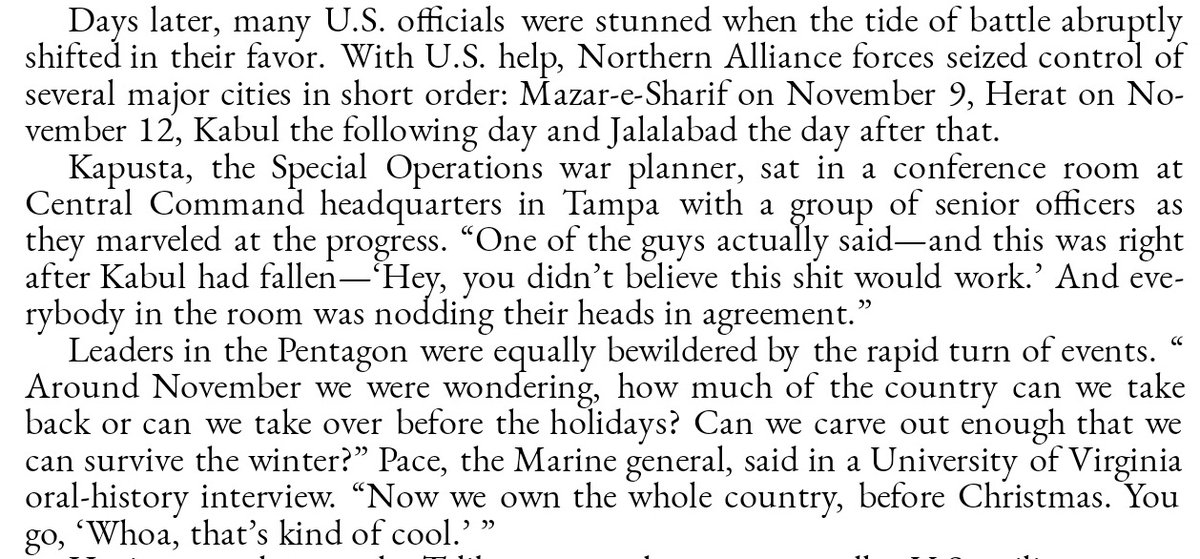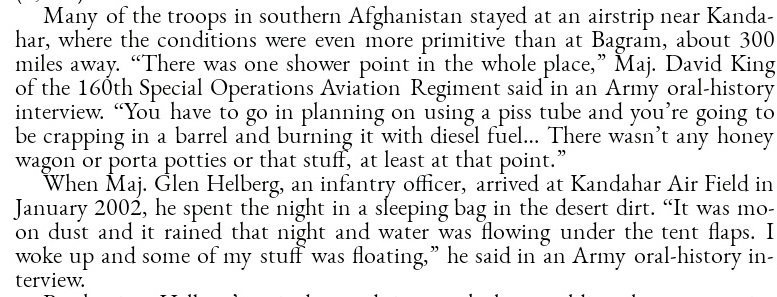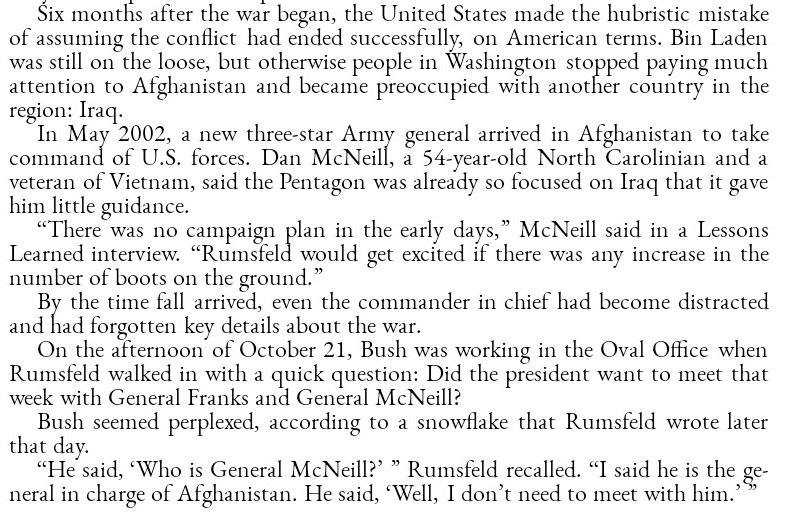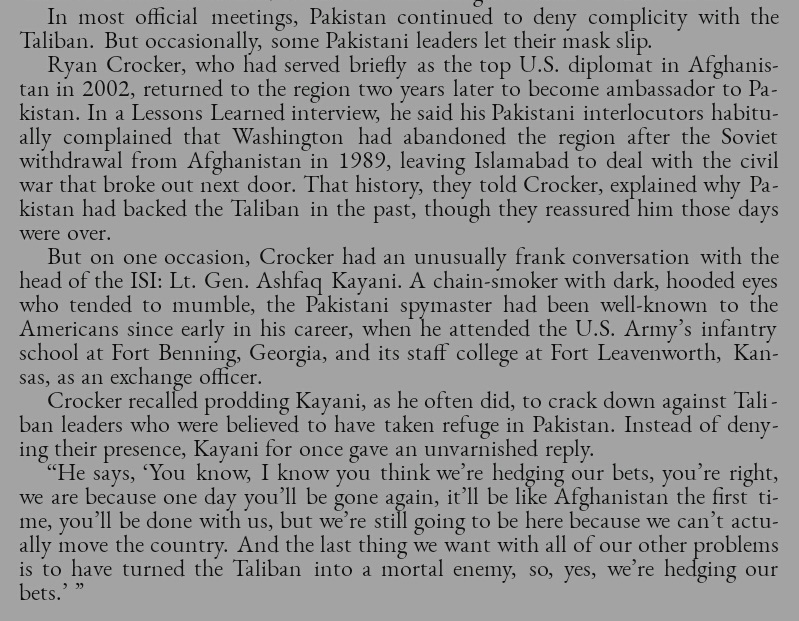
Just finished reading Craig Whitlock's The Afghanistan Papers, a book I believe will go down as the definitive account of the war in Afghanistan for generations to come. I'll be sharing some excerpts of the book in this thread. 

The war was characterized by incredible levels of mendacity on all government levels from the very beginning. Donald Rumsfield was lying about progress in Afghanistan as early as late March, 2002: 
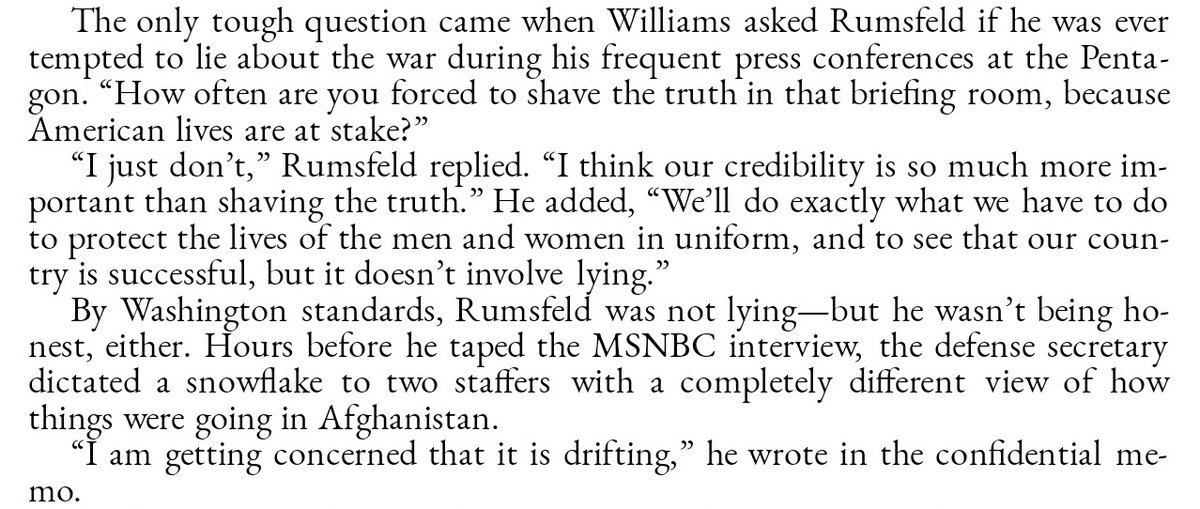
After the Northern Alliance failed to make headway against the Taliban, Rumsfeld ordered Douglas Feith and Gen. Peter Pace, the vice chairman of the Joint Chiefs of Staff, to devise a new war strategy in just four hours: 

Remember those pictures of CIA operatives with long beards dressed in traditional Afghan garb? They were all larpers, none of them knew what he was doing. Soldiers on the ground couldn't even tell friend from foe. Many interacted directly with Taliban fighters without knowing it: 
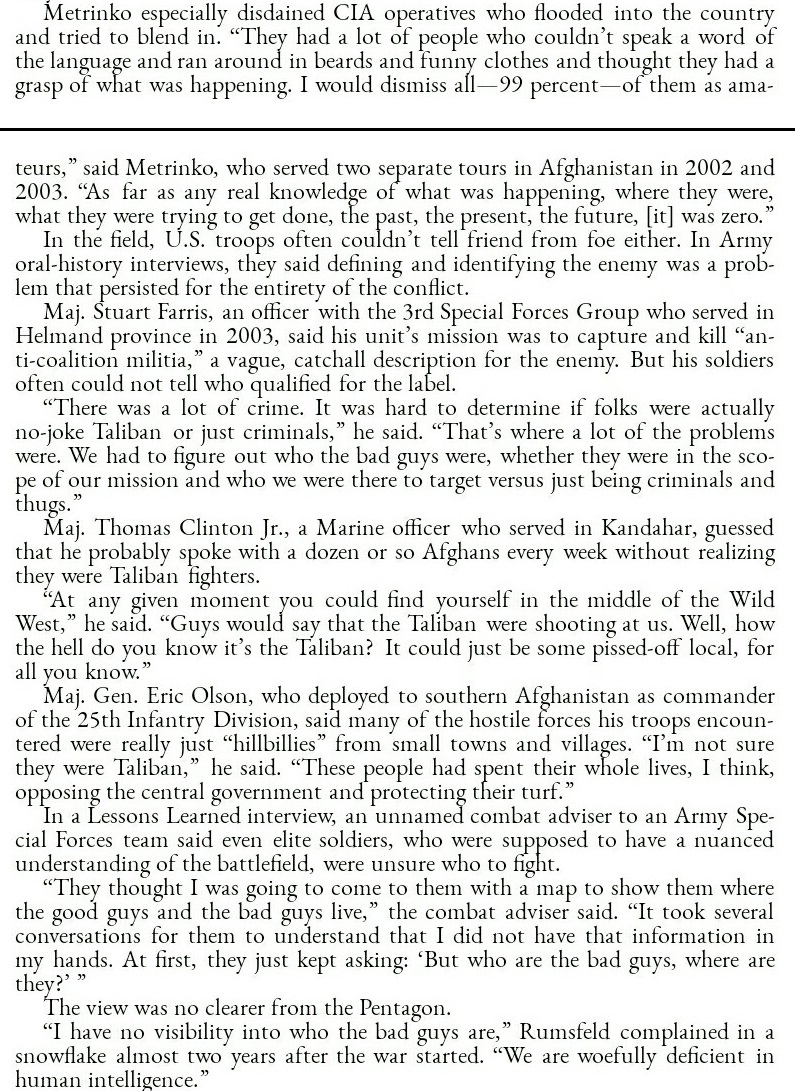
The Navy Seals were a bunch of rascals. Canadian commandos were very deadly, but nice to hang around with: 

In the early stages of the war, the military was so intent on minimizing its presence it refused to bring showers and washing machines into the country: 
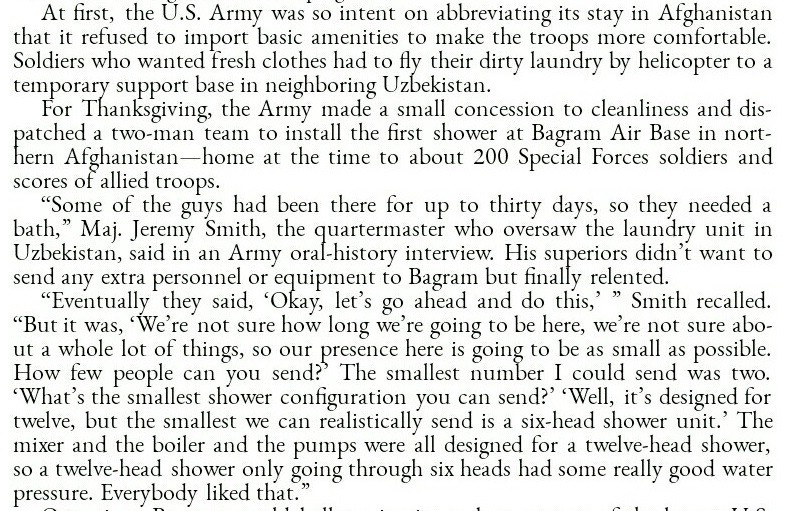
The war effort suffered from aimlessness and vague goals. To the people involved, it was unclear what the US' aims were; nation building? women's rights? defeating the Taliban? defeating groups who worked with the Taliban? Nobody could tell. 

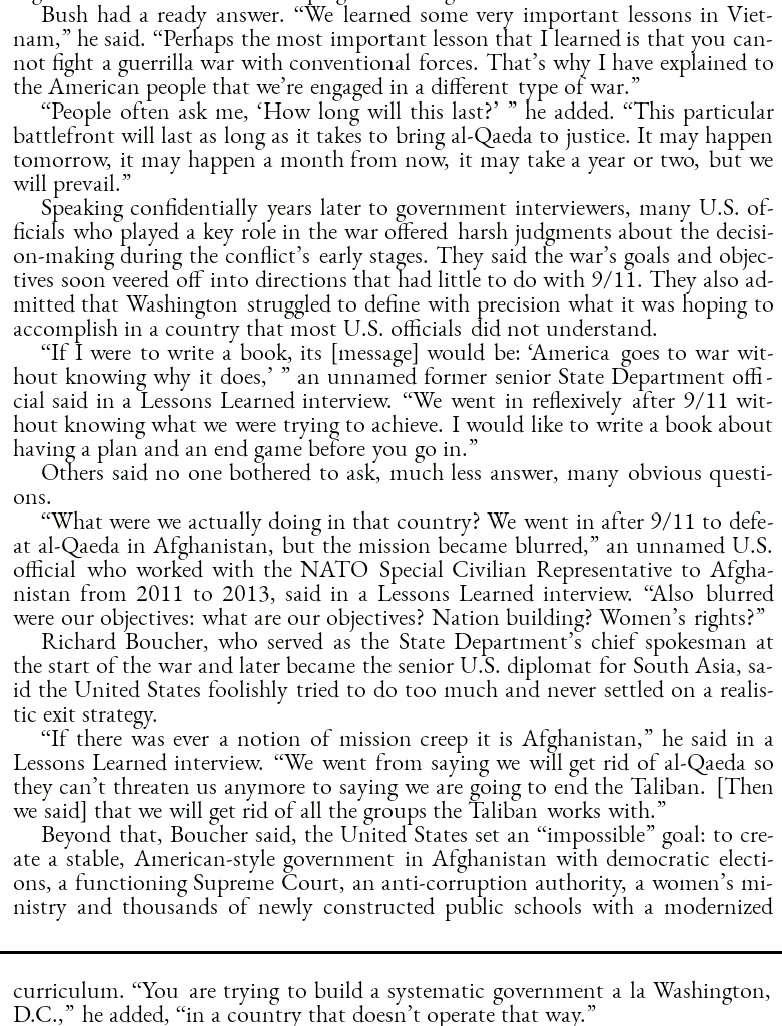

On top of the lies, there was widespread ignorance of al-Qaeda, a group that the US was at war with for quite some time before 9/11. Robert Gates knew "jack shit" about al-Qaeda on 9/11: 
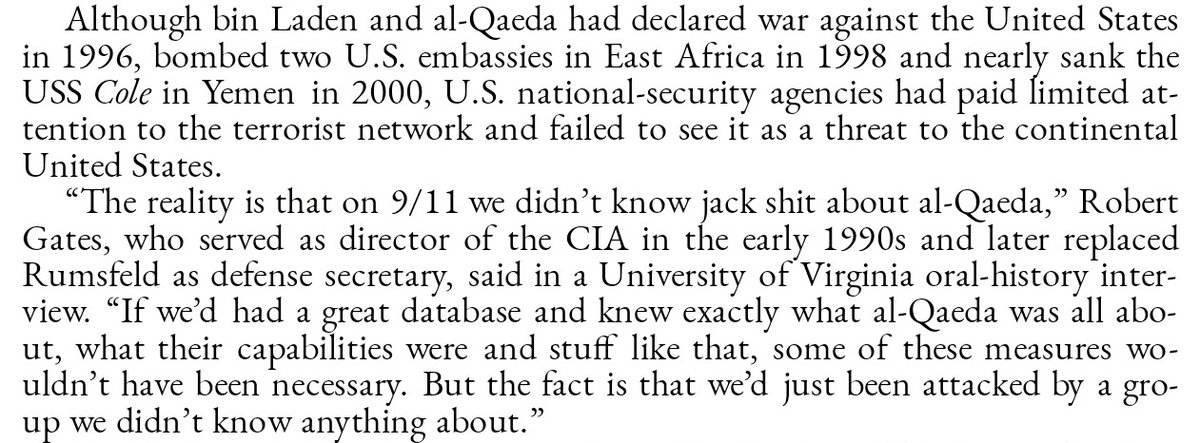
A significant blunder was the way the US lumped al-Qaeda and the Taliban together, foregoing nuance in its prosecution of the war: 

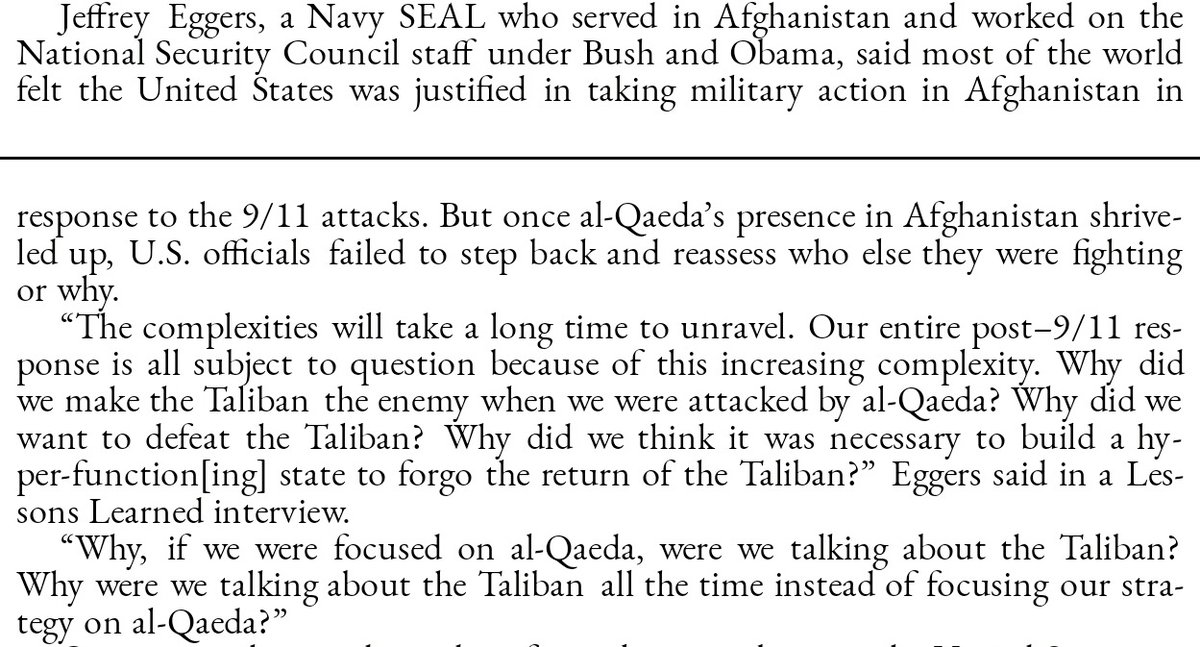
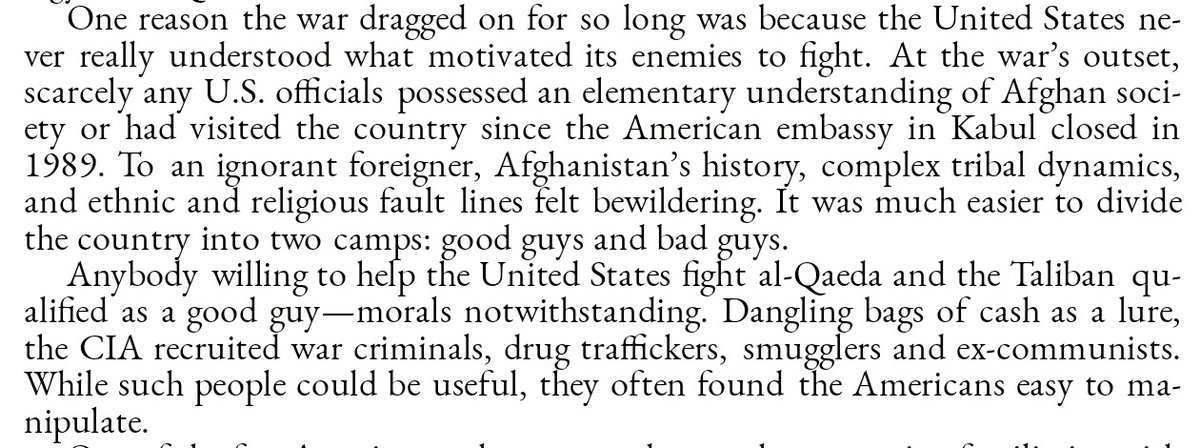
Afghans are the most hardcore libertarians on earth. Not only do they firmly believe that taxation is theft, the US couldn't even convince them that a central government was necessary. Some State Department officials couldn't help but agree. 

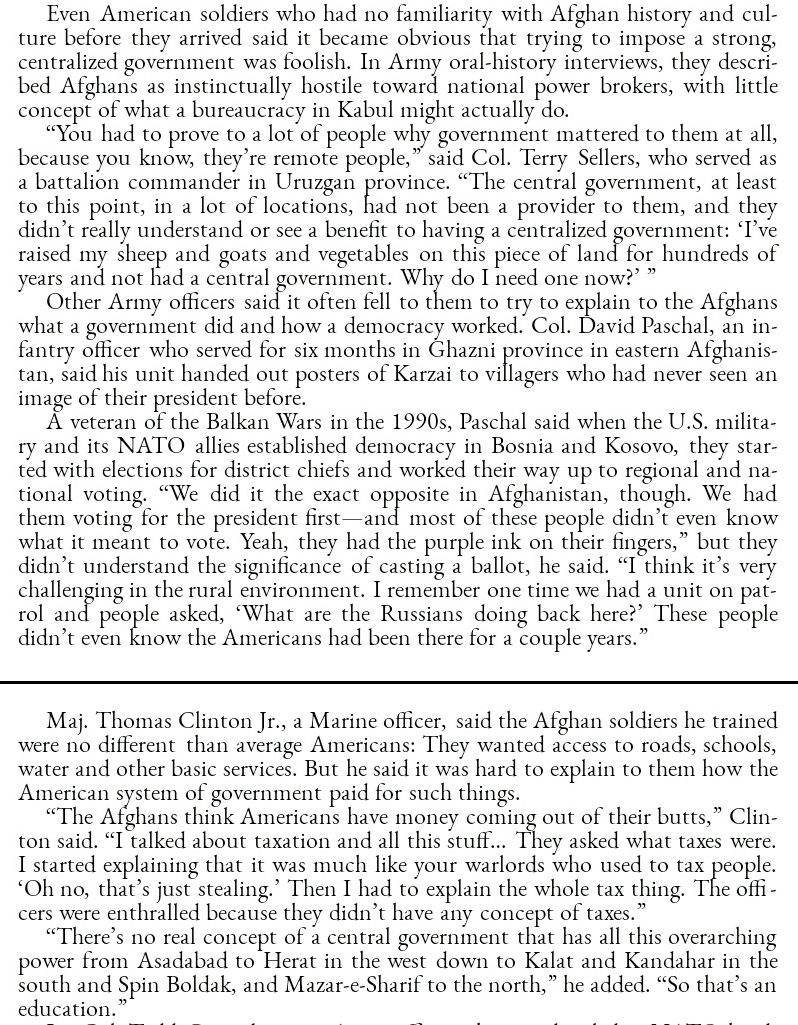
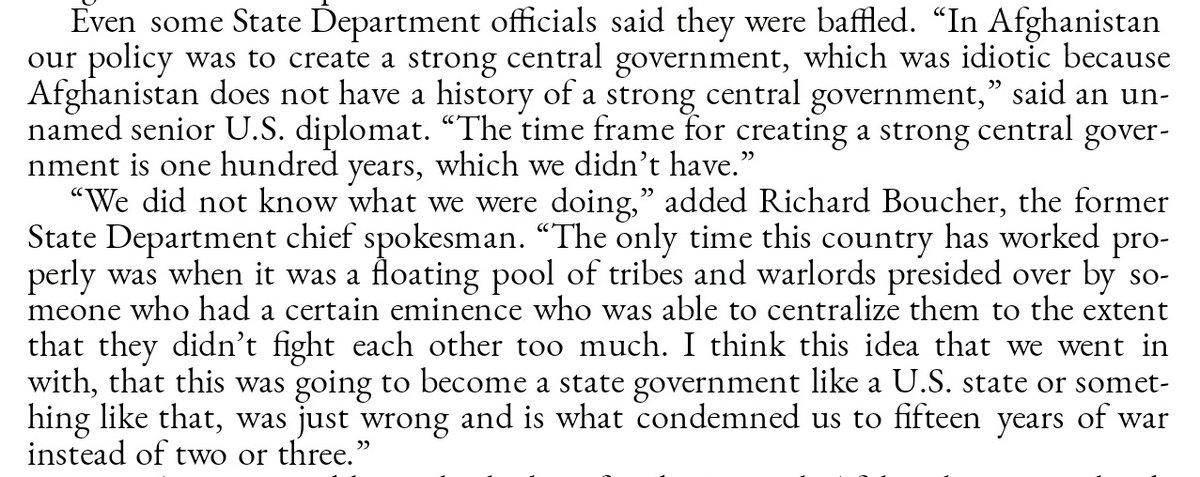
With their armor and high-end tech, US soldiers looked like aliens to ordinary Afghans, many of whom believed that US soldiers could see through walls with their sunglasses: 
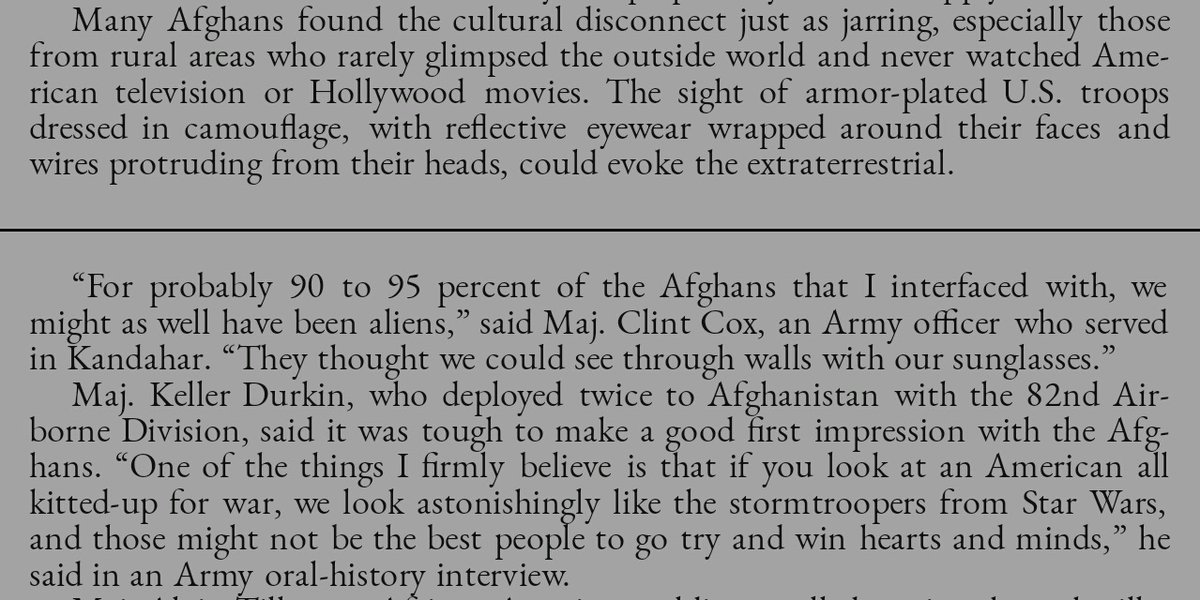
Some aspects of Afghan culture created some pretty awkward situations. In Afghanistan, men expressed their loyalty and friendship by walking together, holding hands, something US soldiers couldn't refuse to do if they wished to avoid insulting their local allies: 

Afghans learned early on that the easiest way to eliminate a rival or to grab a piece of land was to tell the Americans that he was a member of the Taliban: 
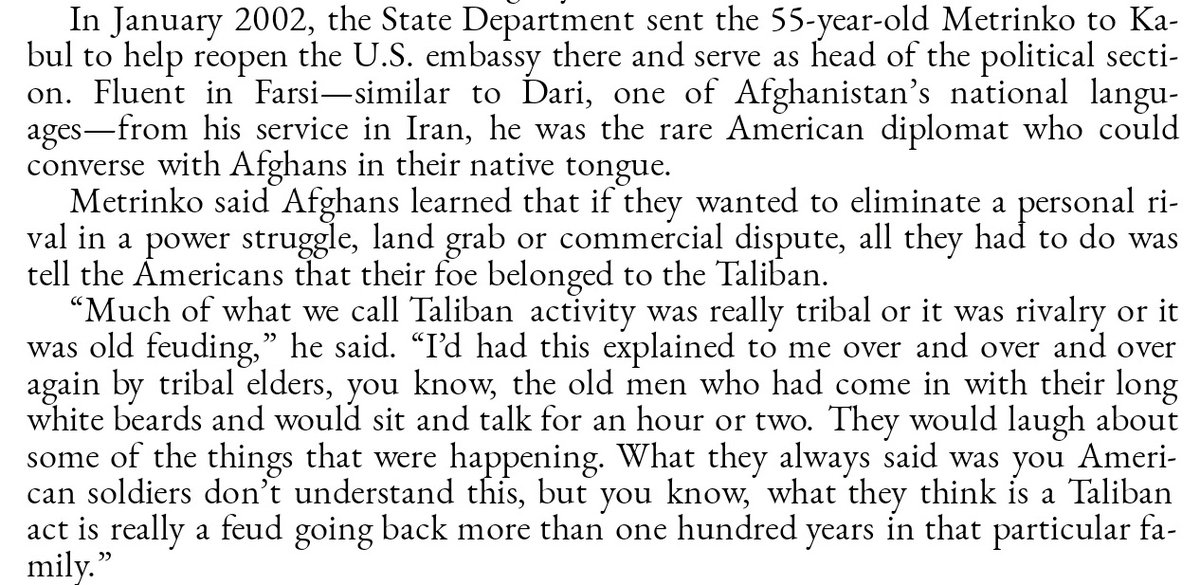
Others learned how to make money exploiting US aid efforts. One guy had his brother blow up a bridge, the Americans rushed in to get it fixed, hiring a construction firm owned by the first guy to do the job: 

The US paid villagers $100 a month to clear up irrigation channels. The result? Teachers quit their schools to go work there. Not that those schools were of much value anyway. Many of them fell to disrepair and were appropriated by the Taliban: 
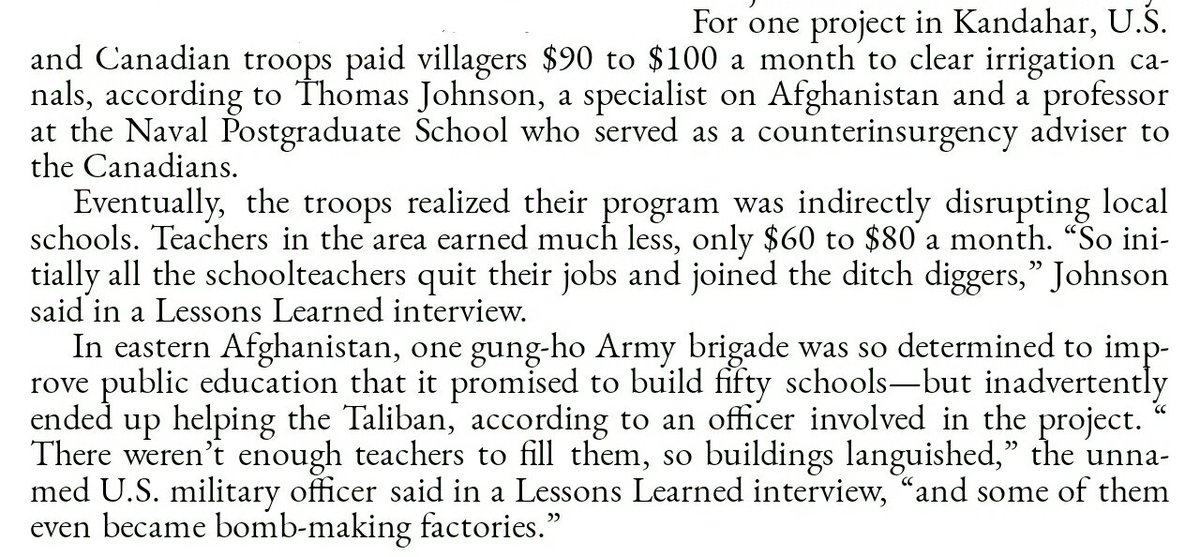
The supply chain of US forces fueled corruption like no other. Fat bribes were paid to police chiefs, warlords, and Taliban commanders to get supplies safely to their intended targets, fueling a vast network of corruption in the process: 
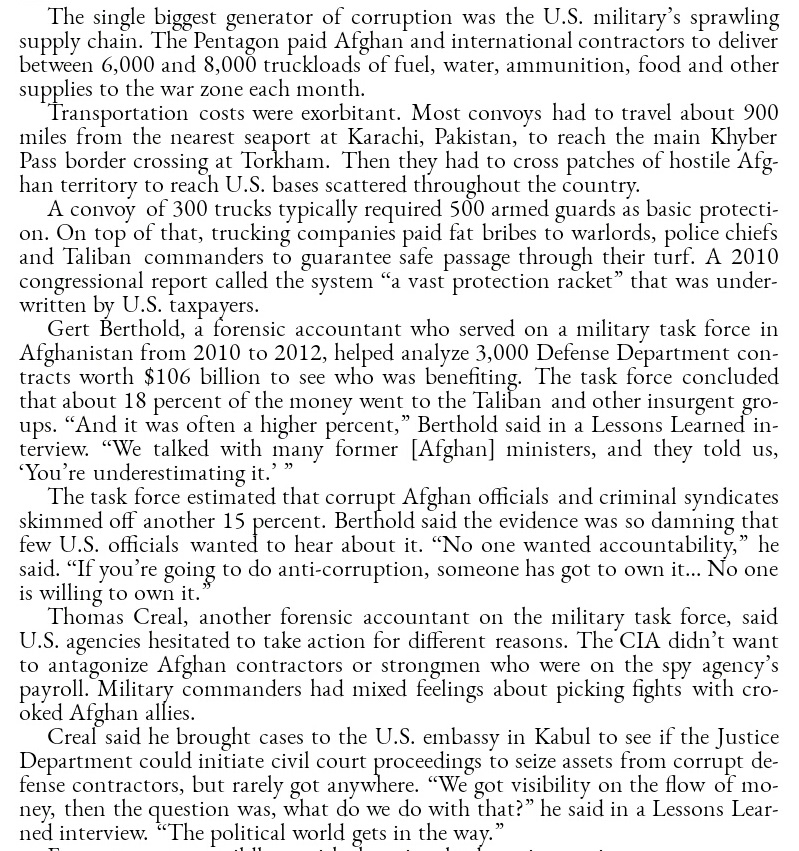
The US government engaged in another form of corruption as well, doling out cash to Afghan lawmakers in order to have them vote in favor of human rights: 
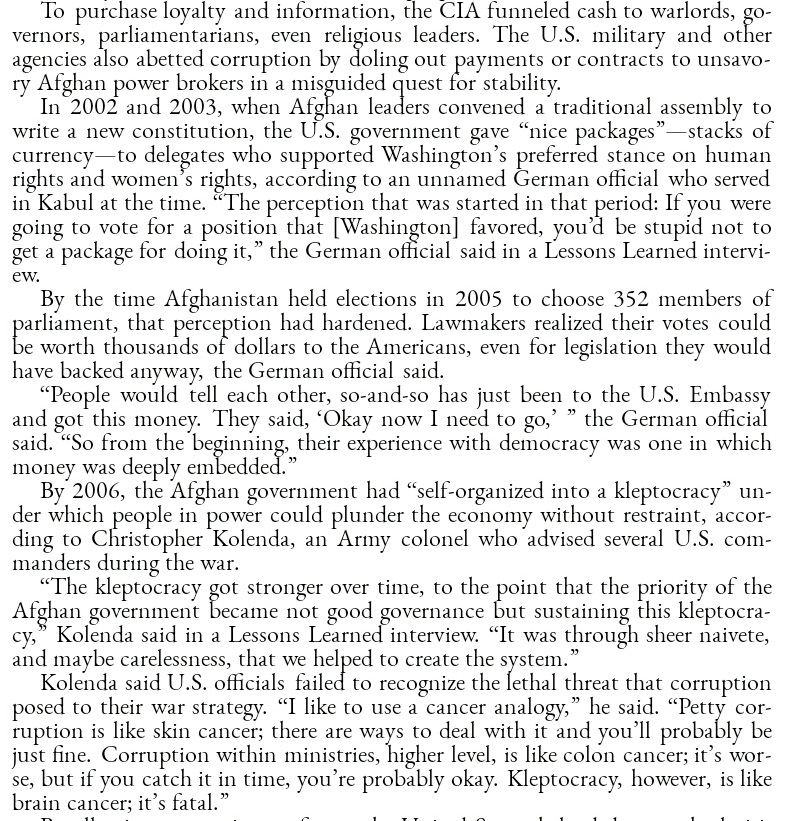
A diplomat named Thomas Hutson tried to convince the notorious warlord Abdul Rashid Dostum to leave Afghanistan by enticing him with the offer of working as an executive producer for a couple of movies he was involved in! 
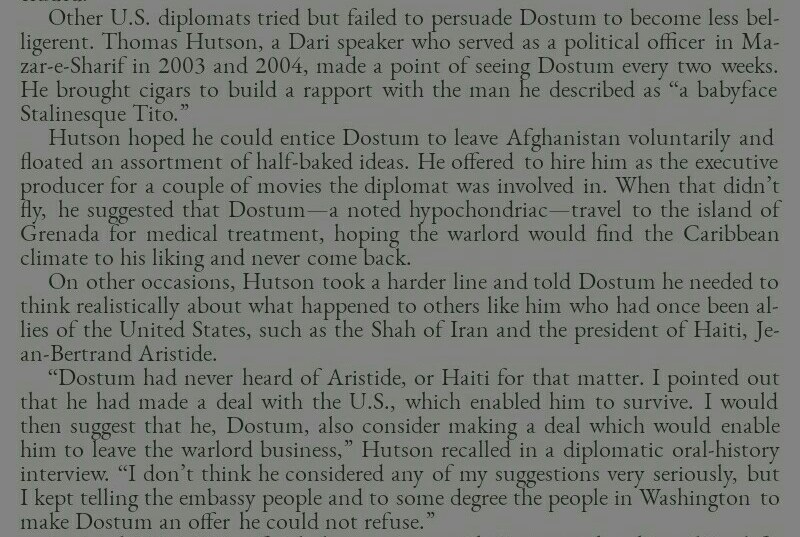
Now to the really spicy part: the criminality and comical incompetence of the Afghan armed forces.
Afghan soldiers could flunk their training or go AWOL and still make it out of boot camp anyway. They had no conception of marksmanship whatsoever, wasting away all their bullets during firefights: 



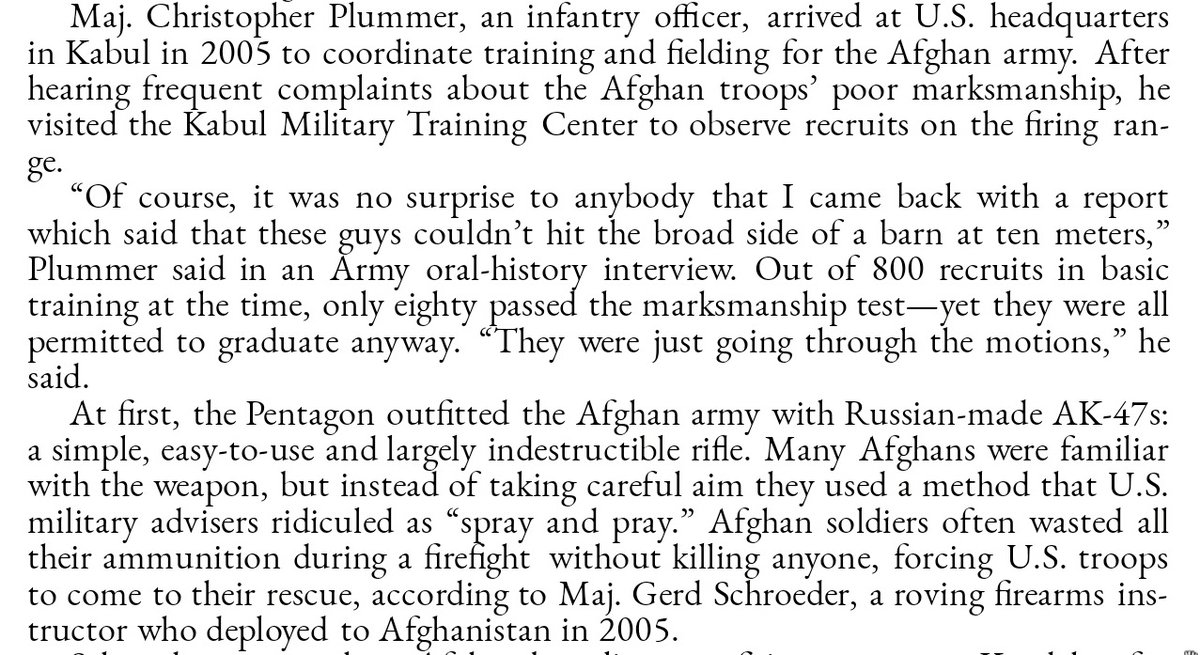
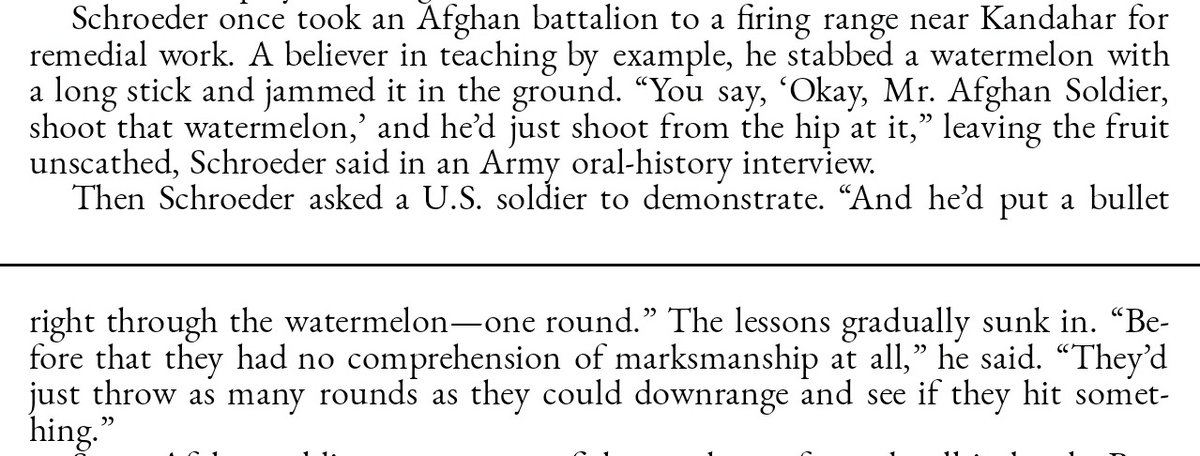
Another thing they had no grasp of was time. Many of them had no watches and did not care what time it was anyway. The idea of preparing in advance for future events was completely alien to them. Getting them to prepare for winter was impossible. 

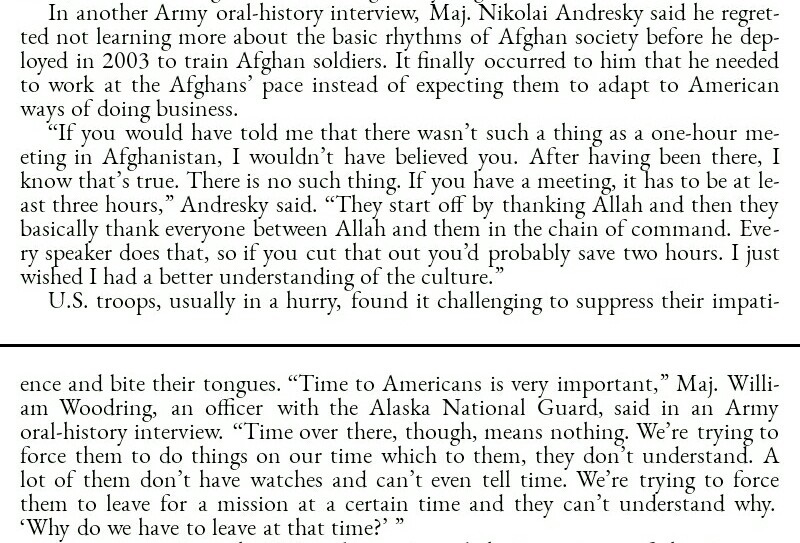
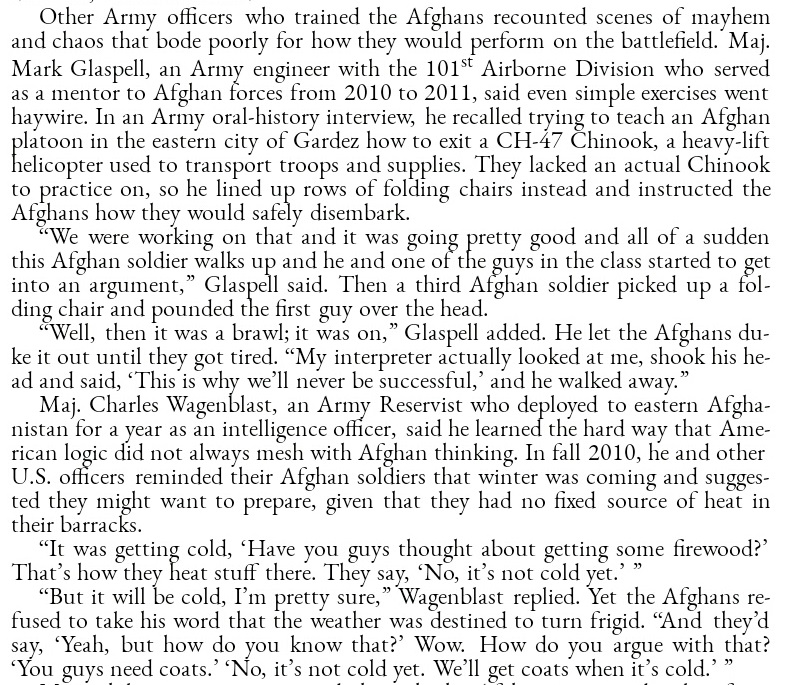
Afghan soldiers had to be taught the concept of caring for their own weapons, instead of just grabbing whatever weapon was available at hand. Some couldn't count how many siblings they had. teaching them to drive was a nerve-racking experience: 


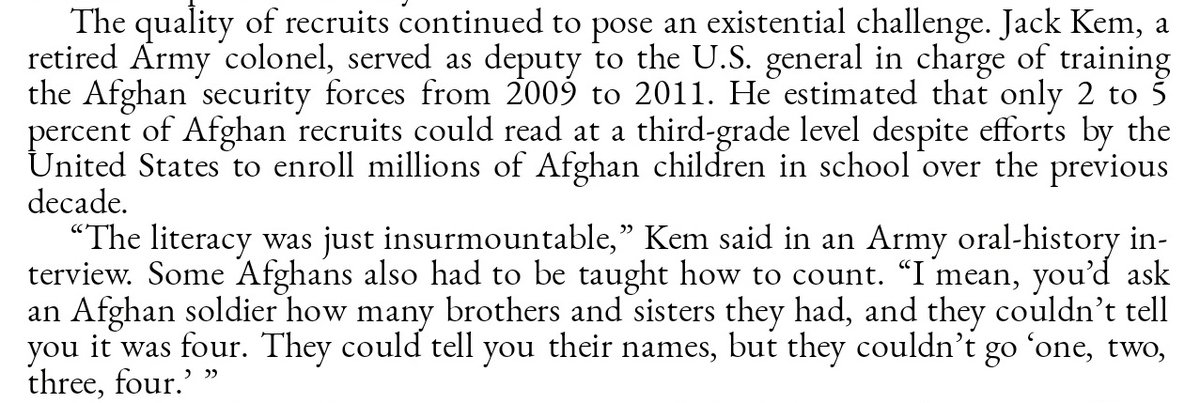

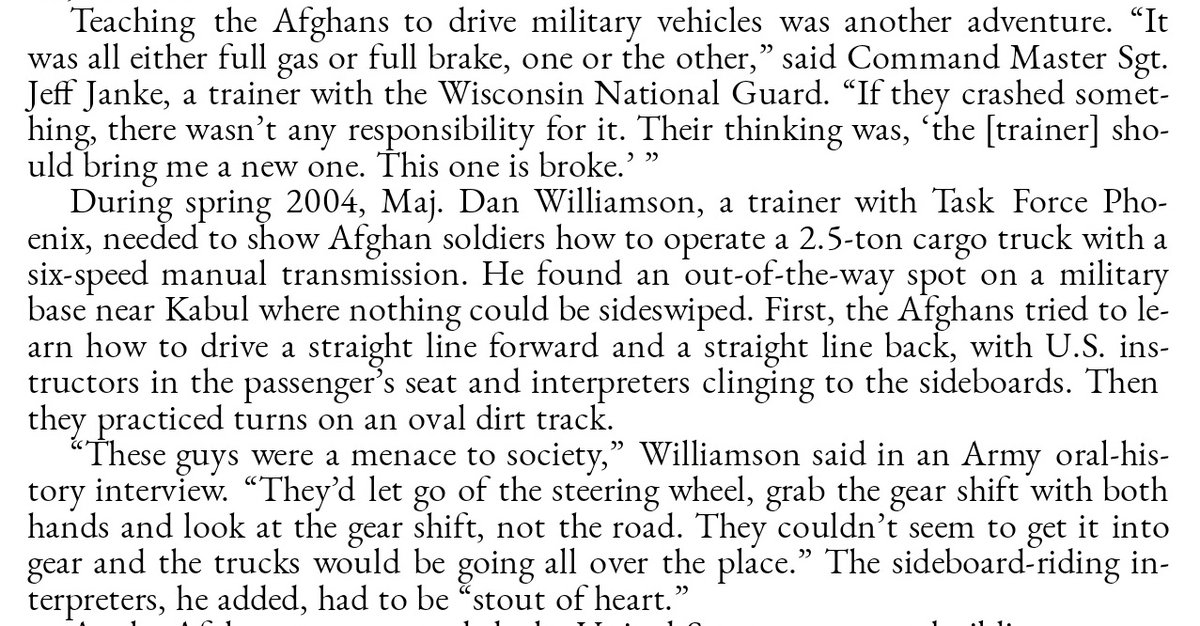
Desertion was endemic among Afghan soldiers, many of whom sold their weapons on the market. If you called the Afghan police after your house got robbed, they would come in and rob it again. As early as 2005, it was clear the Afghan army wasn't going to fight once the US left. 


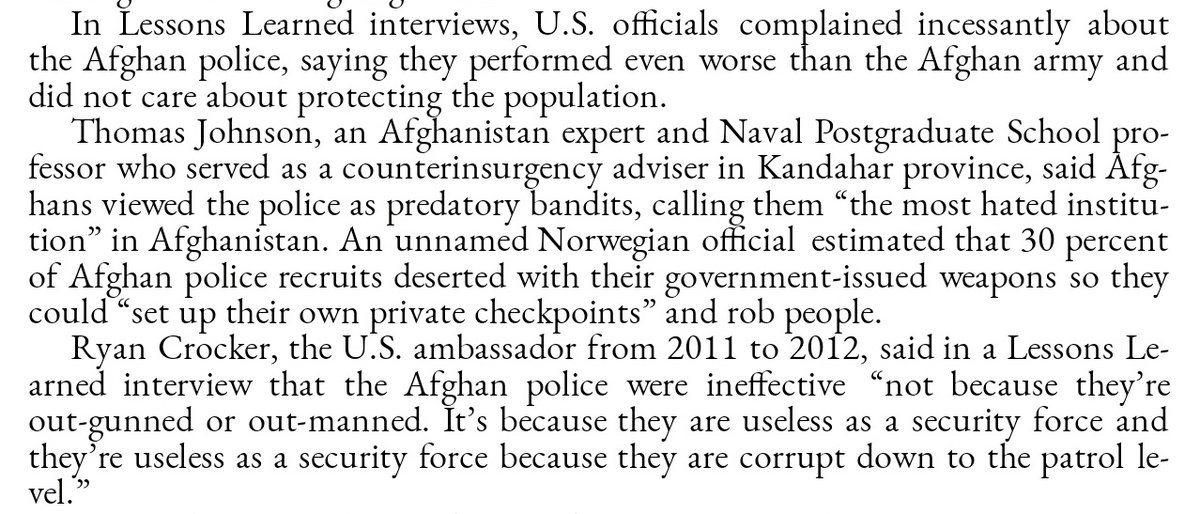
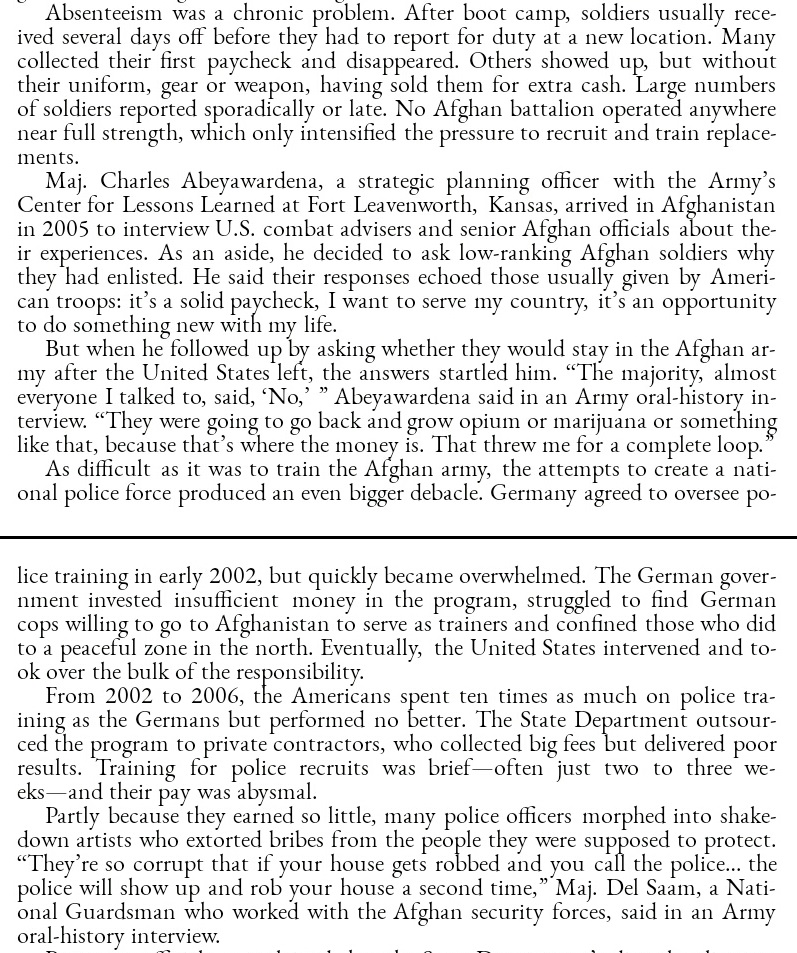
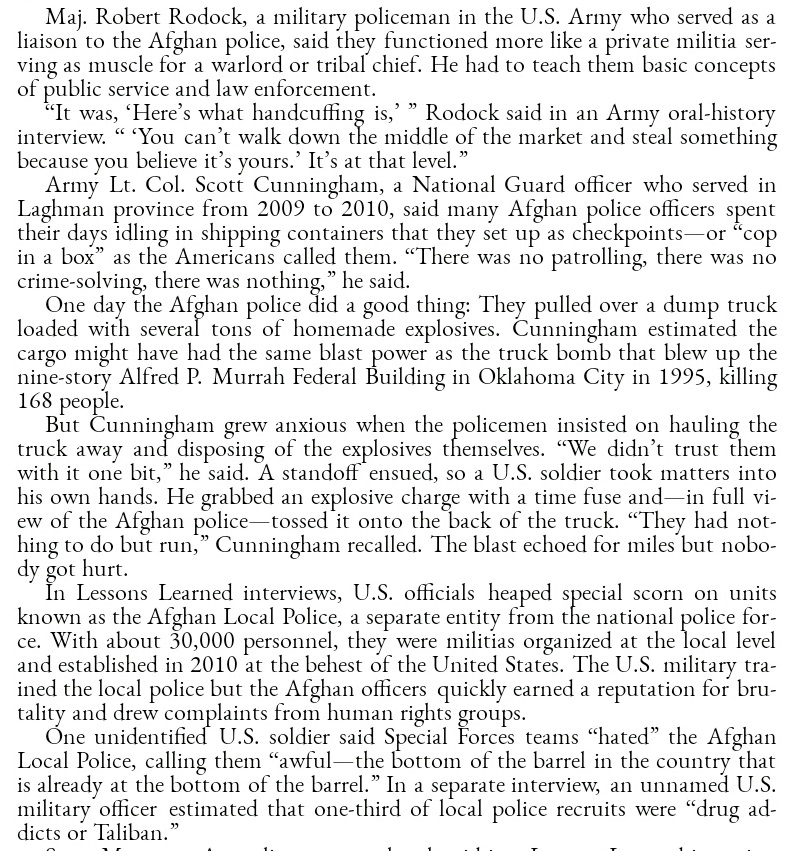
Now to the effort to snuff out Afghanistan's drug industry.
America's war on opium production drove farmers into the arms of Taliban as the poppy fields of connected Afghans were left intact while the government destroyed those of poor farmers. Afghan police solicited bribes in return sparing farmers, all under US protection. 
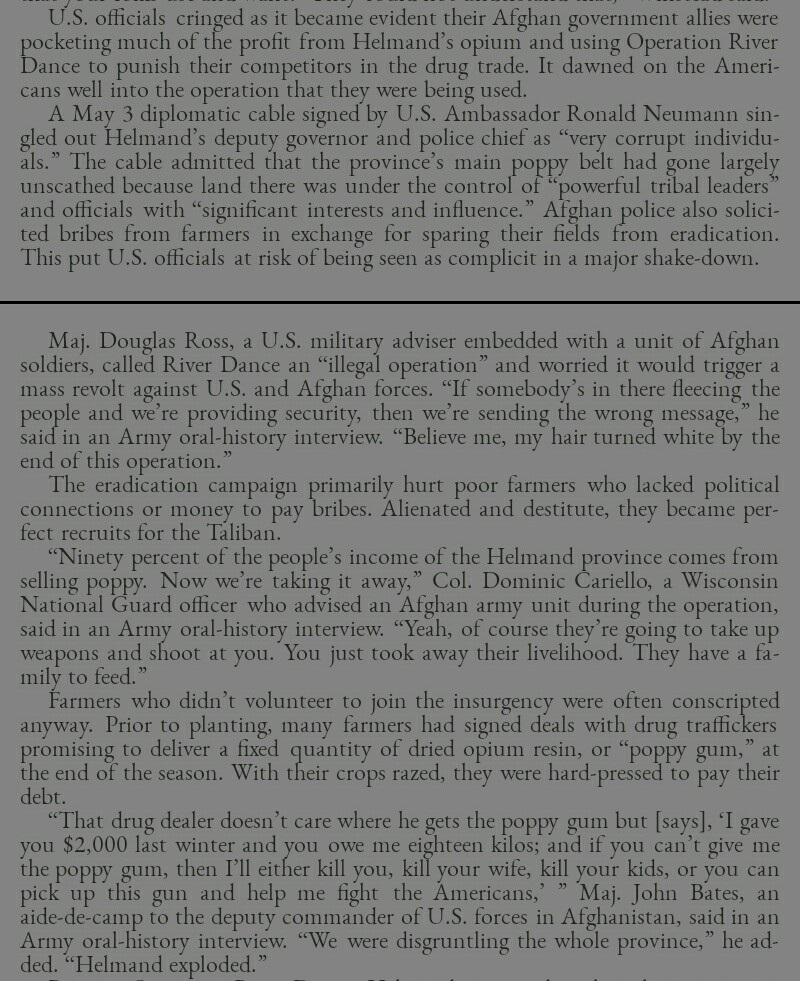
The US pressured the Afghan government to remove a brutal Helmand warlord involved in the opium industry. In his absence, drug trafficking exploded and insurgents started flowing in. 
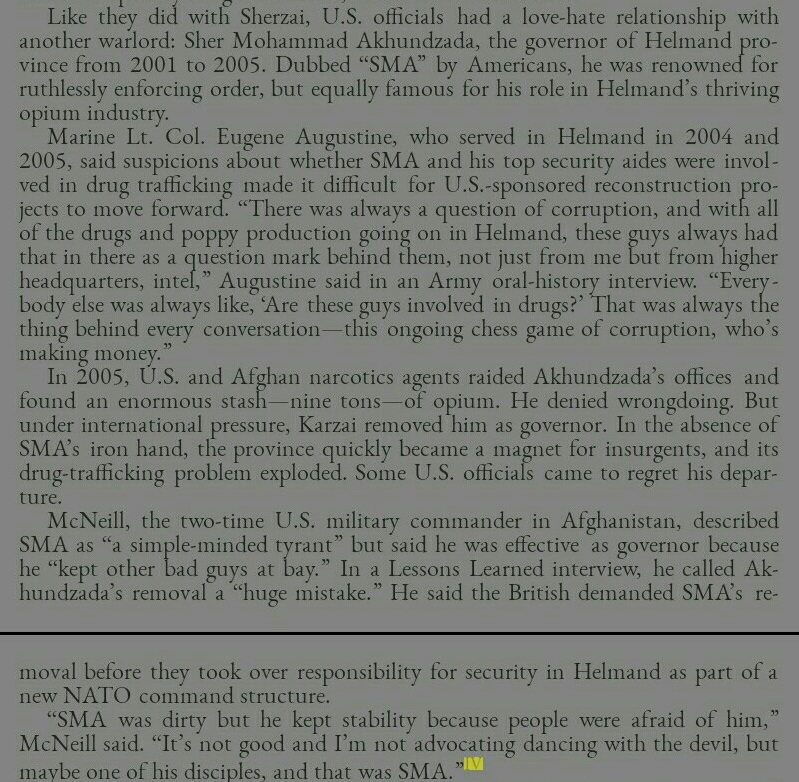
In spring 2002, the British offered afghan farmers $700 an acre in return for destroying their poppy crops. The project ignited a poppy-growing frenzy as farmers rushed to plant poppies in return for British money, furtively selling a good portion of their produce on the market: 
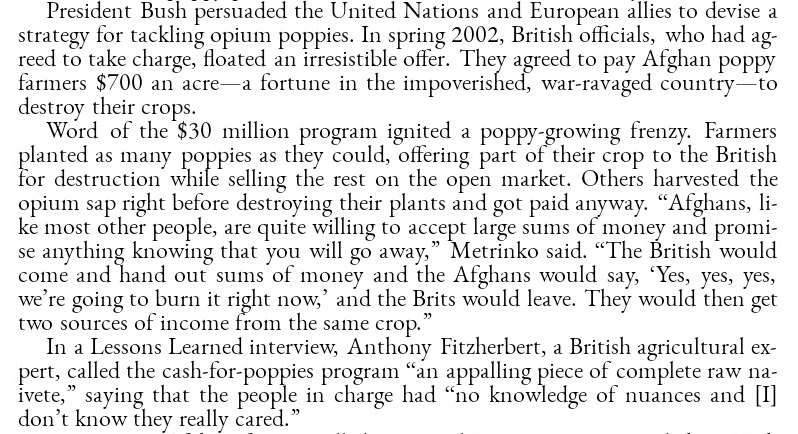
The US tried to dissuade Helmand farmers from growing opium poppies by encouraging them to grow other crops, which it hoped could be done by refurbishing canals and irrigation ditches. These only served to make growing poppies easier and more profitable. 

Ironically enough, the Taliban were the only people capable of actually curtailing Afghanistan's drug industry. In July 2000, Mullah Mohammad Omar declared a ban on growing poppies. As a result, poppy cultivation declined by 90%. 
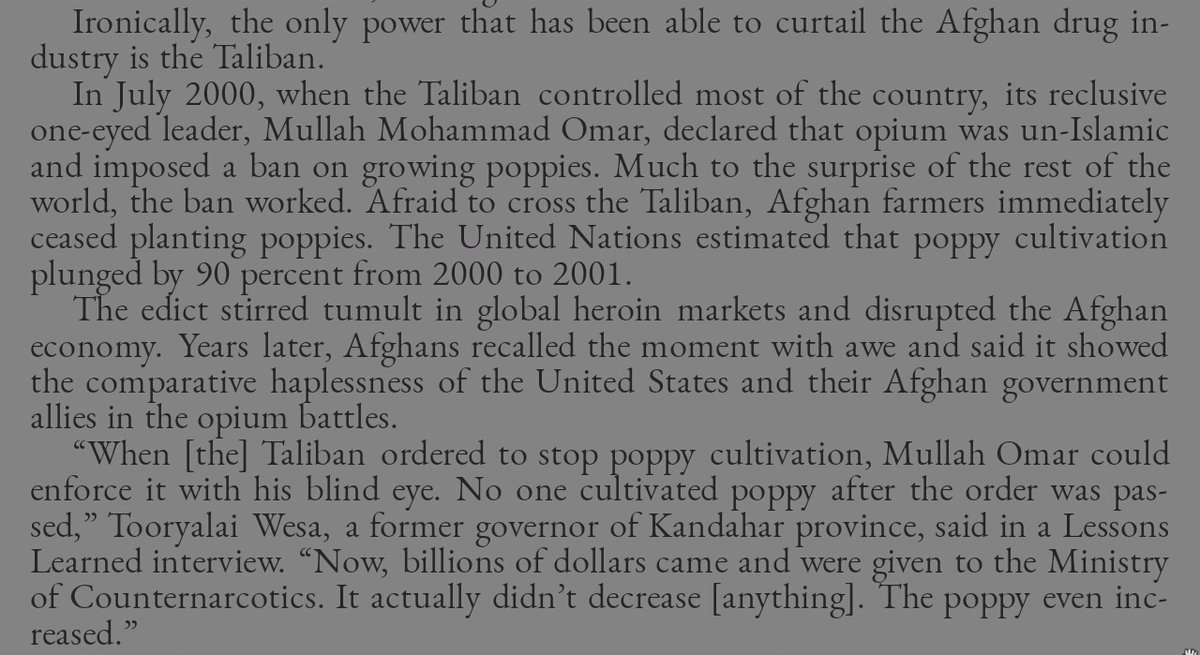
The biggest winner of America's war in Afghanistan? The opium industry. The cultivation of opium poppies skyrocketed under US occupation: 
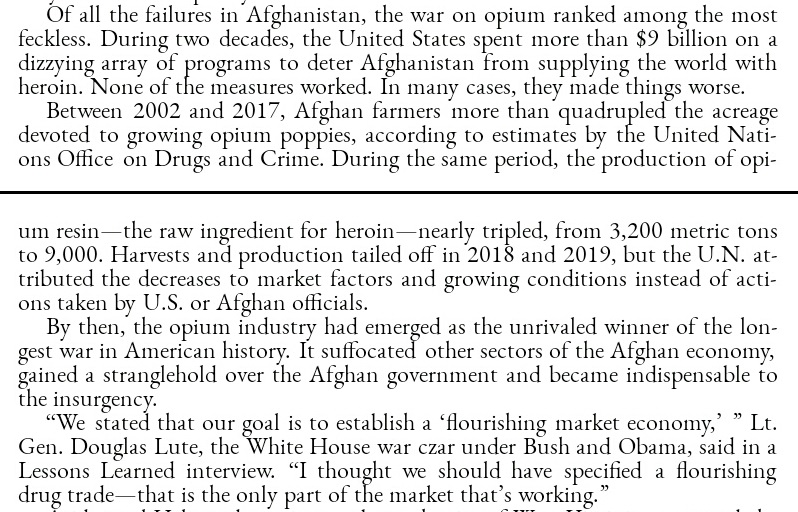
US psy-ops teams handed out soccer balls promoting peace and Afghan nationalism. Kids loved them, but didn't care about the message really. Another batch of balls had a number of national flags on them, including that of Saudi Arabia, which triggered a wave of protests: 
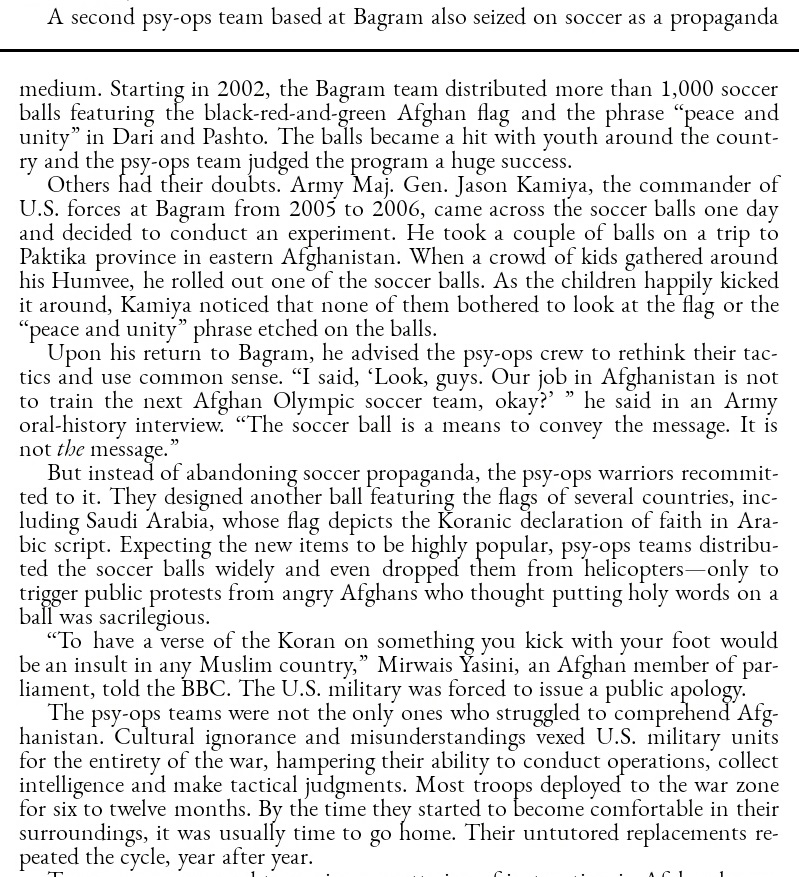
For a period, the US feared that Fahim Khan, a drug-trafficking warlord who played a key role in helping the US topple the Taliban, and who later assumed the role of defense minister, was going to overthrow Hamid Karzai, the Afghan president: 
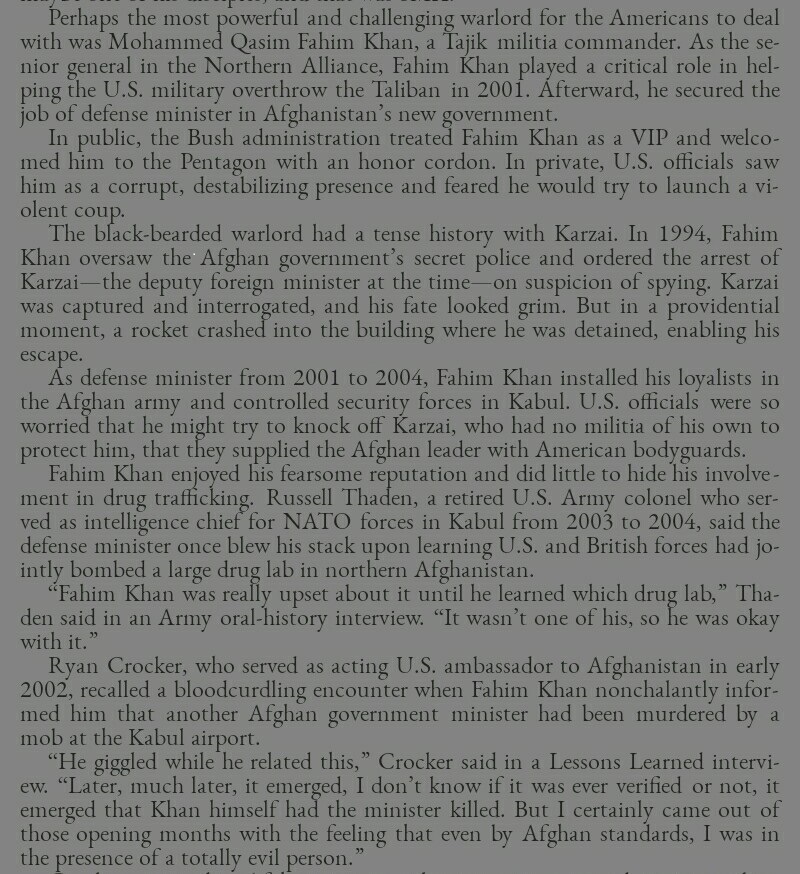
What did Obama admin officials do when failure stared them in the eye? They prevaricated, skewed data, manipulated statistics, and straight up spun facts out of whole cloth. The whole thing amounted to a disinformation campaign worthy of a third world regime: 


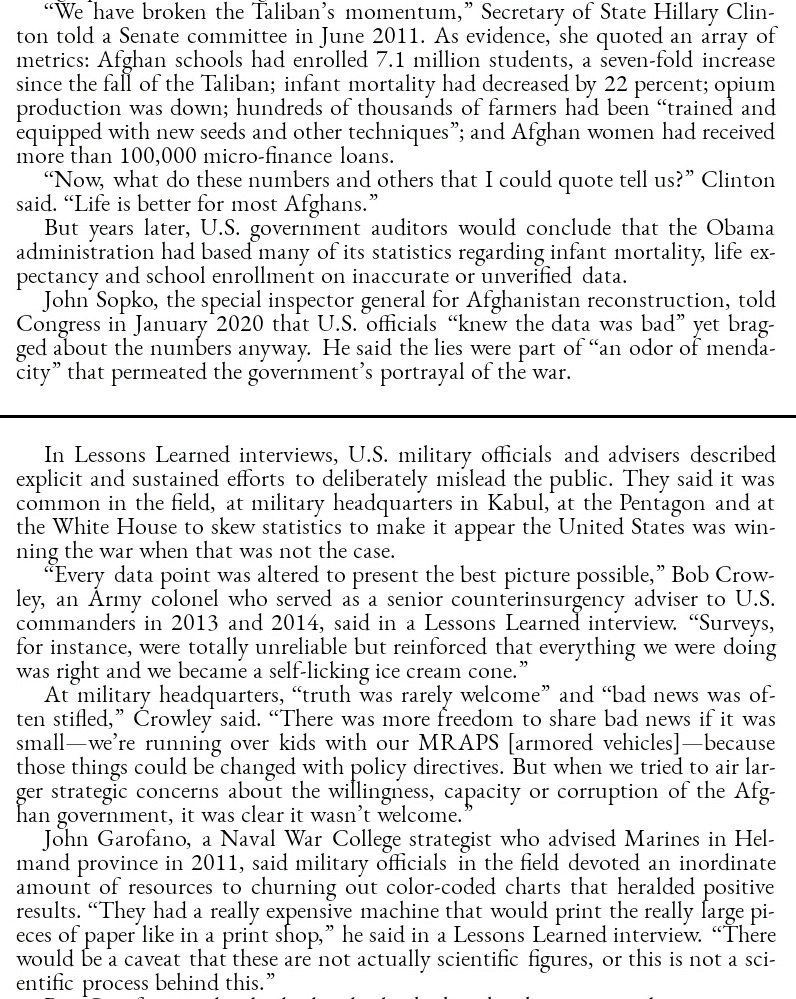
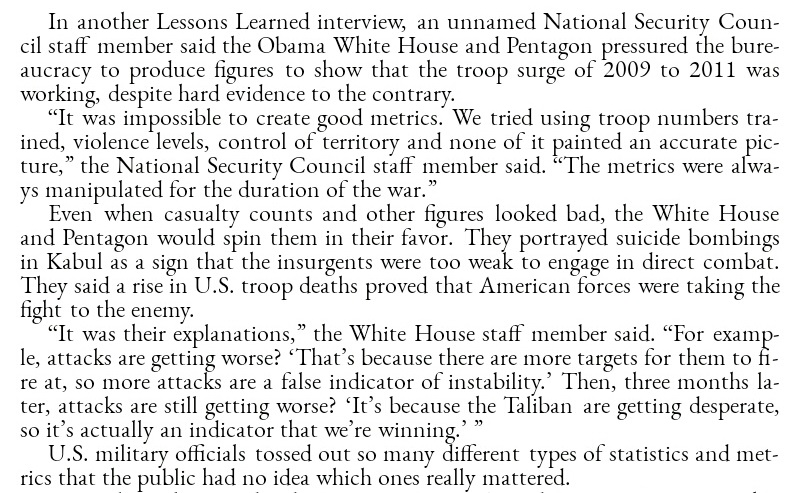
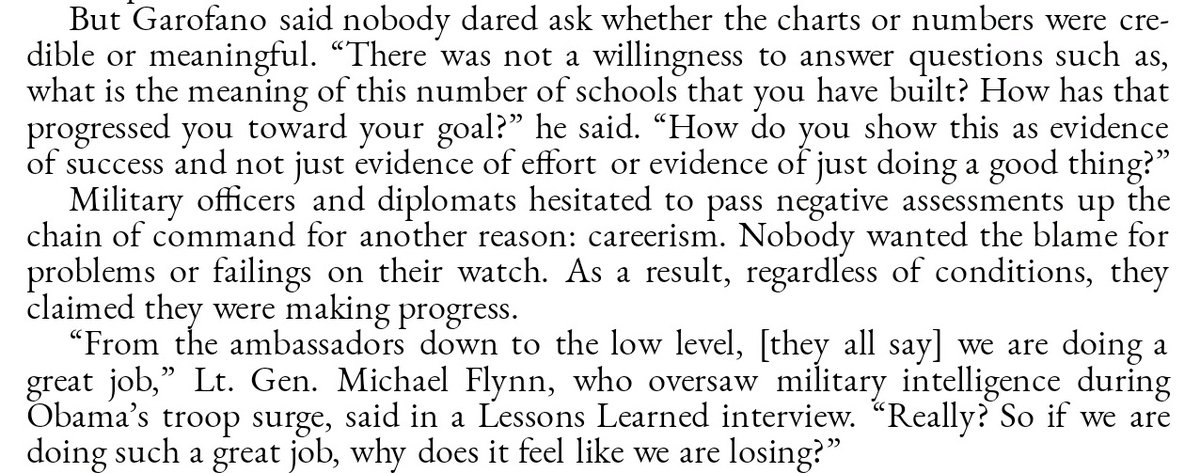
Trump raised the tempo of US airstrikes, killing record numbers of Afghan civilians in the process. In retrospect, this was a truly sad waste of life, given that the US was going to withdraw anyway, and that these strikes failed to alter conditions on the ground. 
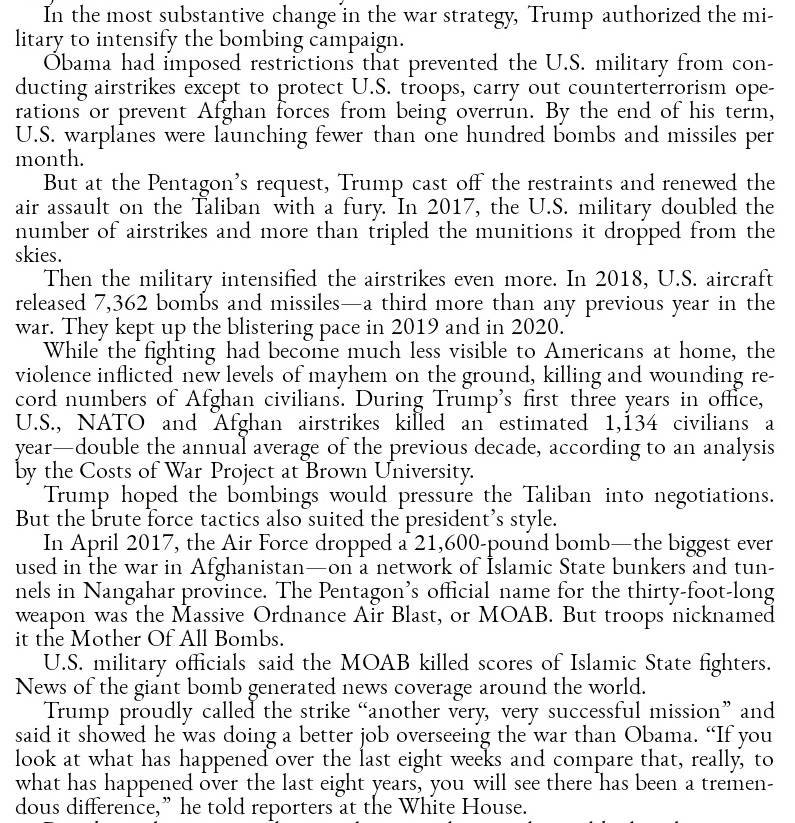
Lastly, the US spent more money on nation building in Afghanistan than it did in Europe with the Marshall Plan. if that isn't sobering enough, I don't know what is. 
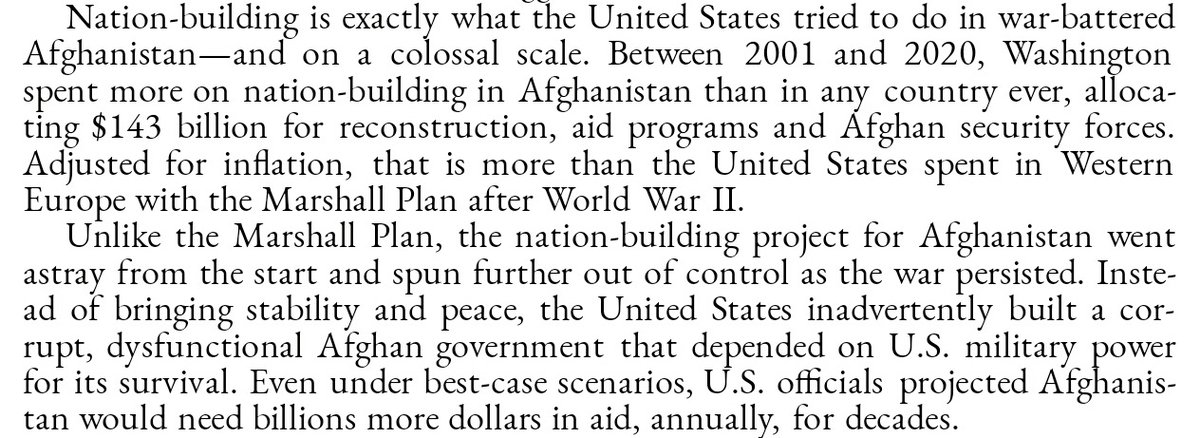
End of thread.
• • •
Missing some Tweet in this thread? You can try to
force a refresh

